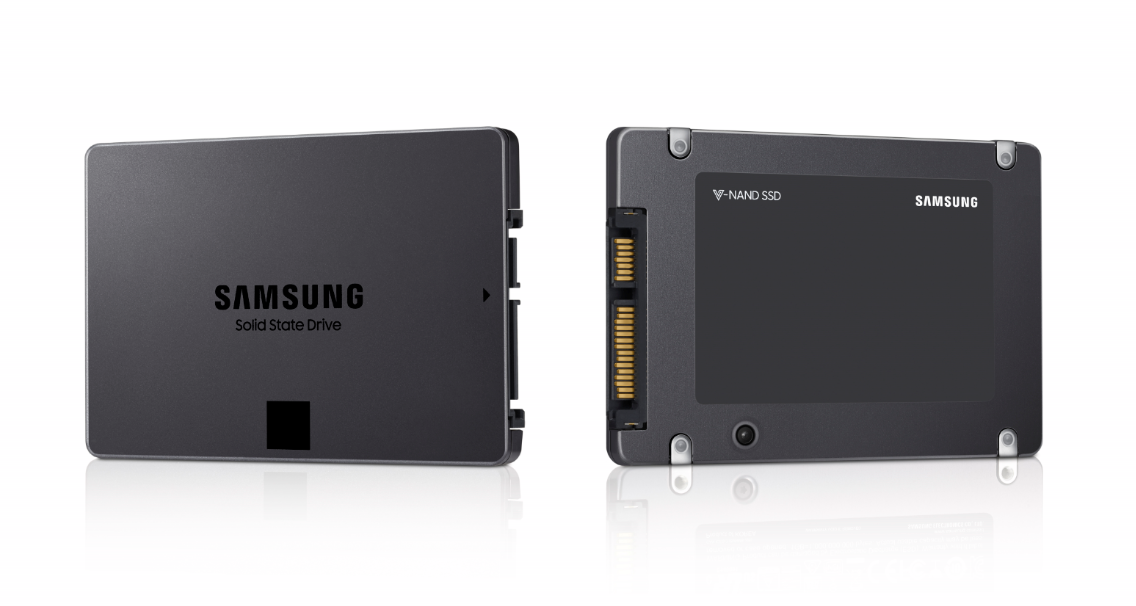Samsung Starts Mass Production of 4TB QLC SSDs
Samsung has entered mass production of the first 4TB QLC SATA SSDs for the consumer market. The news today comes on the cusp of this week's Flash Memory Summit, an annual storage conference where all of the newest flash and memory tech is normally announced. Samsung is usually a premier conference sponsor and dominates the show floor, but the company is curiously absent this year.
In either case, Samsung's announcement of its new 4TB QLC SSD comes on the heels of QLC announcements from Intel, Micron, Western Digital and Toshiba, which leaves SK Hynix as the only flash-fabber that hasn't announced a new QLC product.
| Samsung Flash - Year | Bits per Cell | Nodes | Chip Capacity | Drive Capacity |
| 2006 | 1-bit SLC | 70nm-class | 4Gb | 32GB |
| 2010 | 2-bit MLC | 30nm-class | 32Gb | 512GB |
| 2012 | 3-bit TLC | 20nm-class | 64Gb | 500GB |
| 2018 | 4-bit QLC | 4th generation V-NAND (undisclosed lithography) | 1Tb | 4TB |
Samsung based its QLC flash on the same 1TB V-NAND that it currently uses as a base for its TLC flash. TLC flash stores three bits per cell, making the technology denser and cheaper than previous-generation flash. The move to QLC flash, which stores four bits per cell, promises to bring even lower prices and higher capacity SSDs to the market soon. The extra 33% in storage density results in lower endurance and performance, but advances in 3D manufacturing technology have made the new NAND viable for light-use applications, which includes desktop PCs.
Samsung claims that it has circumvented the traditional challenges associated with QLC flash and can maintain the same speeds that it achieves with its TLC SSDs, like its popular 970 EVO series. Samsung will continue to leverage much of its existing technology, like TurboWrite and its proprietary SSD controllers, and promises sequential throughput of 540/520MB/s read/write. Samsung hasn't provided random performance metrics or endurance, both of which are more important than sequential throughput. The 2.5-inch SATA SSD will come armed with 32 chips based on the company's 4th generation 64-layer flash.
Samsung plans to follow up with 1TB and 2TB models later in the year. Naturally, NVMe SSDs will follow, but they'll come as M.2 models for enterprise applications. The company is also developing a 128GB QLC memory card for smartphones.
Samsung hasn't provided information on shipping dates, pricing, or branding, but more details will likely emerge soon.
Get Tom's Hardware's best news and in-depth reviews, straight to your inbox.

Paul Alcorn is the Editor-in-Chief for Tom's Hardware US. He also writes news and reviews on CPUs, storage, and enterprise hardware.
-
CalHob If you using B and b in the units to indicate bytes and bits, in the table, I believe all entries under Chip Capacity should be expressed in bits (Gb, Tb) and for 2018, Drive Capacity should be 4TB not 4Tb.Reply -
JamesSneed Reply21209094 said:If you using B and b in the units to indicate bytes and bits, in the table, I believe all entries under Chip Capacity should be expressed in bits (Gb, Tb) and for 2018, Drive Capacity should be 4TB not 4Tb.
Bothered me too. I can't read past the chart as I don't trust it. -
JamesSneed Reply21209115 said:b is used most often for measure of speed while B is more for space
No not really they both are units of space. You are thinking when you add time, like Gigabytes Per Second or Gigabits Per Second to show how much over a period of time.
b = bits
B = Bytes
Like CalHob said. -
eltoro @Jaber2 "b is used most often for measure of speed while B is more for space"Reply
This is not accurate.
You're right about network speed or rate, which is usually described with bits ("b"), while storage speed is usually described with bytes ("B"). So it's not only used to describe space. -
JamesSneed Reply21209201 said:@Jaber2 "b is used most often for measure of speed while B is more for space"
This is not accurate.
You're right about network speed or rate, which is usually described with bits ("b"), while storage speed is usually described with bytes ("B"). So it's not only used to describe space.
No its not ever a measure of speed. Sorry but that is wrong. This is like saying feet is used to show speed but miles is used to show distance. There are 5,280 feet in a mile and 8 bits in a Byte. They are all units of measurement and if you want to show speed you could say feet per second, miles per hour, bits per second, Bytes per minute, etc.
You must add time like seconds to it to say this much over this time then you can have speed. The b = bits the B = Bytes. There is nothing more to it. I wish people wouldn't spread incorrect information.
https://en.wikipedia.org/wiki/Data-rate_units
-
jpe1701 I think He's just saying that bits is usually used when network speed in seconds is described, not that the bits is a measurement of the time.Reply -
inanition02 I'd like to see the endurance ratings and prices - even medium endurance (at an acceptable price) could see me move from spinning platters to this for a media server..Reply -
dstarr3 b is bit, B is byte, one byte is eight bits. That's all there is to it. Nothing to do with speed or any kind of use case. Comparing a bit to a byte is like comparing a foot to a yard. One is just many of the other. That's it. They measure the same stuff, just in different quantities.Reply
But this is all why it's important to be consistent in which unit you're actually using, because it's real easy to be wrong by a factor of 8.
